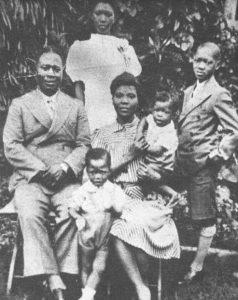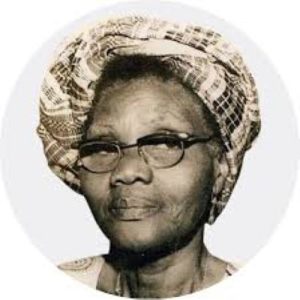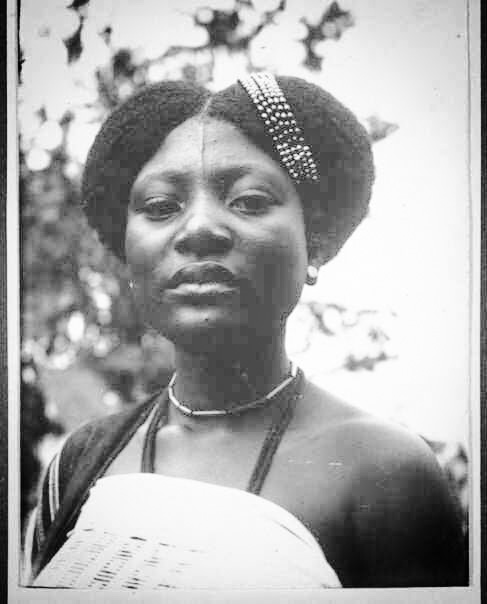In Nigeria’s rich history, there’s one standout figure known for her courage, resilience, and unwavering commitment to social justice: Chief Funmilayo Ransome-Kuti. She championed gender equality and played a crucial role in Nigeria’s journey to independence. Join us as we delve into the life of this remarkable heroine.
Early life
Chief Funmilayo Ransome-Kuti, formerly known as Frances Abigail Olufunmilayo Thomas, was born on October 25, 1900, to Mr. Daniel Olumeyuwa Thomas and Mrs. Lucretia Phyllis Omoyeni Adeosolu in Abeokuta, Nigeria. As a child, she grew up in a highly educated and influential family.
In her days, women were denied access to education. This challenge stemmed from the prevailing societal notion that their primary duty revolved around being wives and mothers. Despite this belief, Funmilayo’s parents ensured she received the best education. She was among the first batch of six female students to attend Abeokuta Grammar School, where she excelled greatly.
In her days, women were denied access to education. However, Funmilayo’s parents ensured she received the best education
Then, in 1919, she travelled to England to further her education. She attended the Wincham Hall School for Girls in Cheshire and Cheshire County Training College, where she was trained to become a teacher. While in England, she also learned French, elocution, music, and various domestic skills. At one point, she decided to drop her English name and shortened her Yoruba name to Funmilayo.

Marriage and family life
In 1925, Funmilayo married Israel Oladotun Ransome-Kuti, who was a medical doctor and the son of a prominent Egba chief. Her husband was also a school principal who strongly believed in uniting people and overcoming differences based on ethnicity and region.
He supported Funmilayo’s ambitions, and their home became a gathering place for activists, intellectuals, and politicians. Their marriage was blessed with three sons named Olufela, Bekolari, and Olikoye, as well as a daughter named Dolapo.
Becoming a voice for change
When Funmilayo returned to Nigeria in 1922, she started working as a teacher. While working across several schools, she experienced the barriers faced by women in accessing education and economic empowerment. These experiences inspired her to become an activist. She was among those at the forefront, challenging injustice and advocating for a more equitable society.
She was among those at the forefront, challenging injustice and advocating for a more equitable society
In 1928, Funmilayo started one of the first preschool classes in Nigeria. At the same time, she created a club for young women from wealthy families to encourage their personal growth. She also organised classes for women who couldn’t read or write.
In 1946, she and Grace Eniola Soyinka [Nobel Laureate Wole Soyinka’s mother] founded the Abeokuta Women’s Union (AWU) to champion women’s rights and challenge oppressive colonial policies. As time went by, the AWU recorded over 20,000 official members, with up to 100,000 additional supporters.

Community empowerment initiatives
Funmilayo actively participated in the Nigerian nationalist movement and co-founded the Nigerian Women’s Union (NWU) in 1949. The NWU later merged with other organisations to form the National Council of Nigerian Citizens (NCNC). Through her involvement in these political organisations, she amplified the voices of the Nigerian people and advanced the cause of self-governance.
As the president of the Abeokuta Women’s Union, she organized women’s protests against colonial policies and oppressive practices. She challenged traditional gender roles, dismantled patriarchal structures, and fought for women’s equal rights and opportunities. She was the first woman in Abeokuta to drive a car, thereby breaking barriers and defying societal expectations.
Through her involvement in political organisations, she amplified the voices of the Nigerian people and advanced the cause of self-governance
In late 1947, the authorities in Abeokuta started restricting women from organising protests. In response, the women labelled their events as “picnics” and “festivals” instead. Their clever approach attracted up to 10,000 participants to these demonstrations, some of which resulted in clashes with the police.
In February 1948, tensions rose between AWU protesters and the authorities. The Alake, a local ruler of the Egba people, insulted the AWU women and banned Funmilayo from the palace. Despite that, AWU members continued with their protests and petitions. By late April of the same year, the Alake yielded and suspended an unjust taxation that the women had vociferously kicked against. In 1949, the Alake was temporarily demoted and that marked a milestone for the Abeokuta Women’s Union.
Funmilayo’s impact was not limited to Nigeria. As a member of the Pan-African Women’s Liberation Organisation, she contributed to the broader struggle for women’s rights and liberation across the African continent. Her international advocacy and connections helped amplify the voices of African women and paved the way for greater recognition of their experiences and contributions.
Advocacy for Nigerian independence
While fighting for gender equality, Funmilayo was also a key figure in the Nigerian nationalist movement. She played a pivotal role in the fight for Independence alongside prominent leaders like Nnamdi Azikiwe and Obafemi Awolowo. Her involvement was not limited to ideology alone; she actively participated in different political organizations.
Through these political organizations, she mobilized support for independence, participated in political campaigns, and advocated for self-governance. Her efforts contributed to the eventual Independence of Nigeria in 1960.
funmilayo was the first woman in Abeokuta to drive a car, thereby breaking barriers and defying societal expectations
Confronting challenges
Funmilayo’s activism made her the target of colonial authorities, who saw her as a threat to their control. In 1949, she led the “Women’s War” (also known as the Abeokuta Riots) against the traditional ruler of Abeokuta. The protests were a response to unfair taxation policies and the imposition of an Alake-appointed chief. Due to her involvement in the protest, she was arrested.
In 1953, she was arrested again along with other AWU leaders for allegedly inciting women to riot during a protest against the imposition of a regent by the colonial administration. Sometimes, during their protests, tear gas canisters were thrown at them. Despite facing legal repercussions, Funmilayo remained steadfast in her commitment to fighting for justice and equality.
Her husband, Israel Oladotun, was one of her steadfast supporters. Being a medical doctor, he provided medical care and support to activists and community members in need. Tragically, he passed away in 1955 aged 63, after a long illness caused by prostate cancer.
She challenged traditional gender roles, dismantled patriarchal structures, and fought for women’s equal rights and opportunities
The death of a warrior
Funmilayo raised her children to be human rights activists. Fela Anikulapo-Kuti, her son, was well known for criticizing the Nigerian military government. To show his disdain for the Nigerian government, he called his home “the Kalakuta Republic” and transformed it into a place where friends and supporters could gather without worrying about the military.
On February 18, 1977, Funmilayo Ransome-Kuti was at her son’s compound when a large group of armed soldiers forcefully entered the property and began to destroy things. During the chaos, both Fela and Bekolari were brutally beaten.
Tragically, Funmilayo, who was about 77 years old at the time, was thrown from a second-floor window by the soldiers. The fall caused her to sustain grave injuries. After being taken to the hospital, her condition deteriorated, and she eventually fell into a coma. Funmilayo Ransome-Kuti passed away on April 13, 1978, and the impact of her death was widely felt.
she was the first woman to be appointed to the Western House of Chiefs
Honors and recognitions
During her lifetime, individual awards and recognitions were not very prevalent. However, she still received some accolades.
In the early 1950s, she was the first woman to be appointed to the Western House of Chiefs.
She was also bestowed with the chieftaincy title of Oloye of the Yoruba people.
In 1965, she was honoured with membership in the Order of the Niger.
In 1968, the University of Ibadan awarded her an honorary doctorate of law.
She was also recognized with the Lenin Peace Prize in 1970.
Funmilayo co-founded the Nigerian Union of Teachers and was dedicated to improving education and labour rights.
In 1969, she became the chairman of the Advisory Board of Education appointed by the government of Western Nigeria.
She also served as a consultant to the Federal Ministry of Education.
In addition, Funmilayo Ransome-Kuti has received numerous posthumous honours and accolades for her remarkable achievements and contributions. She is revered as a national heroine in Nigeria, with various institutions, streets, and buildings named in her honour.
In conclusion, Funmilayo was a trailblazer who fearlessly challenged the status quo. Even in her passing, her legacy continues to inspire and uplift future generations.


